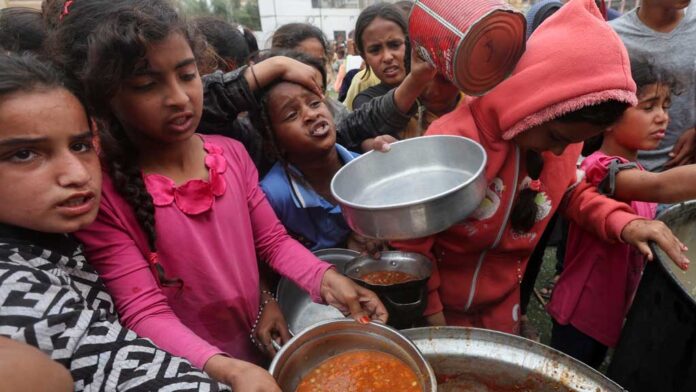For six weeks, Rehab Akhras and her family have managed to survive the relentless airstrikes in Gaza. But now, with all Israeli checkpoints sealed since early March, she fears that hunger will soon claim their lives instead.
Since Israel imposed a total blockade on the 2.3 million residents of Gaza, food reserves stockpiled during the brief ceasefire at the start of the year have nearly vanished. Emergency meal distributions are coming to an end, bakeries have shut down, and markets are barren.
On a patch of packed ground in a makeshift camp in Khan Younis, where Akhras, 64, and her displaced family have taken shelter, she lights a fire with scraps of cardboard to heat their last can of beans.
“We are a family of 13—what can one can of fava beans do for us?” she asks.
“We have survived the war, we wake up and go to sleep amid airstrikes. But we cannot survive hunger, neither we nor our children.”
Further north in Nuseirat, hundreds of Palestinians queue up at an outdoor emergency kitchen for a portion of rice. Small children press to the front, clutching empty buckets, hoping to bring home food for their families.
Aid agencies responsible for these emergency meals warn they will have to stop within days if no additional food is allowed in.
Before the blockade, the World Food Programme supplied bread through 25 bakeries across Gaza. Now, every single one is closed. Food parcels, already distributed at reduced rations, will soon run out entirely.
‘DEEP HUNGER’ TAKING HOLD
“All basic supplies are running out,” said Juliette Touma of UNRWA, the UN agency for Palestinian aid. “The price of goods has skyrocketed since Israeli authorities imposed the blockade.
“This means babies and children are going to bed hungry. Every day without basic supplies, Gaza moves closer to very, very deep hunger.”
Gaza’s residents can recite the soaring prices of what little remains in the markets: a 25-kilo sack of flour, once $6, now costs ten times as much. A liter of cooking oil, if available, is now $10 instead of $1.50. A single can of sardines costs $5.
“Food distributions have almost stopped,” said Gavin Kelleher, an access manager for the Norwegian Refugee Council in Deir al-Balah. “The last stocks are being used to keep emergency kitchens running for a few more days, but that, too, will soon end.”
Medical organizations, including Médecins Sans Frontières, report encountering cases of severe malnutrition among children and pregnant women. Lactating mothers are too malnourished to produce milk for their babies.
Despite mounting evidence, Israel denies that Gaza is experiencing a hunger crisis. The Israeli military accuses Hamas of misusing aid and argues that blocking supplies prevents militants from accessing resources.
“The IDF is following the directives of the political leadership. Israel is not transferring and will not transfer aid into the hands of terrorist organizations,” the military said.
Israel’s Ministry of Foreign Affairs claims that during the 42-day ceasefire before the border closure in March, 25,000 aid trucks entered Gaza. It alleges that Hamas diverted this aid for military purposes—a claim Hamas denies, accusing Israel of using starvation as a weapon of war.
In Nuseirat, Neama Farjalla wakes up every day at dawn, leading her children across the war-ravaged landscape in search of a meal from one of the few remaining soup kitchens.
“If we don’t die from airstrikes, we will die from hunger,” she says.
“When my young son asks, ‘Mama, can I have a glass of milk?’ my heart breaks.”



